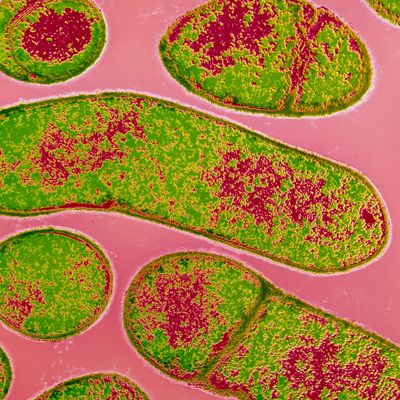
If you read or hate-read Goop, you’re probably aware of the theory that there are tiny poisons running rampant throughout your body — against which your poor liver stands helpless. The term detoxing is thrown around liberally to describe the physical act of ridding your body of harmful, self-inflicted excesses, often with a puritanical bent. Check out any grocery store or deli and you’ll see countless detox drinks, detox tea, even detox cereal. We’re told in yoga class that spinal twists can detox the liver; that lymphatic drainage massages detox your body.
Toxins are portrayed as sneaky little molecules that seemingly lurk around every corner, threatening to turn us into bloated shells with one foot in the grave unless you DETOX IMMEDIATELY.
The term has become so ubiquitous — and yet so meaningless — that we recently found ourselves asking: What the hell is a toxin, anyway? Are they more than a marketing tool cooked up to make women feel that their basic biology is failing them? There’s a vocal contingent of health-care professionals denying that we need to detox at all, and an equally loud minority — including some seemingly non-quacky physicians — saying exactly the opposite. So which is it?
A toxin is generally described as any molecule that doesn’t “belong” in your body or that can potentially cause harm to your cells. Or, as Dr. Woodson Merrell, founding executive director of the Continuum Center for Health and Healing puts it, “anything at the wrong dose can be toxic or harmful to the body.” He explains that toxins are “different for each person because people have a very wide range of genetic abilities to move toxins from their body.” Toxins include things like chemicals, metals, pollutants, poisons, and, in some cases, even food. (Think gluten for people with celiac disease; milk for the lactose intolerant; sugar and alcohol for anyone who ingests too much of it.) The bacteria that forms when you have a food sensitivity (because your gut can’t break down the food molecules properly) can release toxins. Many medicines, such as antibiotics, chemotherapy, and even Tylenol, can also be toxic.
Studies have linked specific environmental toxins like pesticides and PVC to childhood obesity, cancer, and asthma — and a famous report by the Environmental Working Group found scary combinations of chemicals in cord blood samples of some newborns, meaning that exposure can potentially begin in utero. Lead can cause developmental and learning disabilities; bisphenol A (BPA), commonly found in plastic bottles, can cause brain, behavioral, and prostate problems; and bacterial toxins from common infections like staph can cause heart disease. But even Dr. Merrell acknowledges, “The problem is, there hasn’t been a lot of research on the effect of this cumulative [collection of chemicals] together.” But according to Dr. Frank Lipman, the founder and director of the Eleven Eleven Wellness Center in New York City, toxicity often manifests as nonspecific symptoms: fatigue, puffiness, bloating, gassiness, bad skin, and joint pain. We also have no way of knowing, he says, exactly how many toxins are in our bodies. Testing is expensive and not always conclusive, and the effects of these chemicals sometimes take decades to manifest as diseases.
With an increasing number of pollutants in the air and our food — according to a Medscape article from a few years ago, the number of potentially cancer-causing chemicals in use has increased tenfold since 1975 — the toxin situation is only getting worse. While both conventional medicine and integrative/alternative medicine practitioners agree that environmental toxins are a public health problem, they diverge when you start debating whether you can actually do anything to remove any of these chemicals, beyond what your liver is already programmed to do. “What happens is that our body’s normal detoxification processes get overwhelmed by the number of toxins we are exposed to,” said Dr. Lipman. “That is, there is too much garbage for our garbage system to cope with and it overflows. And you know what happens when the garbage overflows.”
The theory, then, is that juicing and/or detox supplements can pick up the slack. But, as Dr. Lipman warned me, “You’re going to get a lot of different viewpoints” on whether detoxing actually works. “The doctors are going to say it’s bullshit.” Dr. Kuemmerle, a gastroenterologist and the interim chair of physiology and biophysics at the Virginia Commonwealth University Medical Center, didn’t call bullshit exactly, but he did say that detoxing “has taken on this air of ‘ridding your body of evil humors.’ A lot of it is just common-sense dietary stuff.” He suggested that drinking eight glasses of clean water a day goes a long way toward keeping your liver functioning optimally.
It’s true that there isn’t any hard, scientific evidence to back up detox claims. Many experts have come out vocally against detoxing as a sham. “Detoxification and cleansing have been practiced for millennia, and come and go as health-related fads. Regulation and science are both lacking. A Google search for ‘juice cleanse’ yields over 1.75 million hits, where a search of PubMed, which searches the medical literature, yields only one, which discusses using juice to unclog a feeding tube,” said Dr. David Seres, the director of medical nutrition at New York Presbyterian/Columbia University Medical Center. “The body is extremely efficient at removing toxins, and the means most likely to prevent disease from toxins is a reduction in exposure.”And how do we even know that all those vague symptoms are due to toxins, anyway? We don’t. But if a detox makes you feel better, does it even matter?




